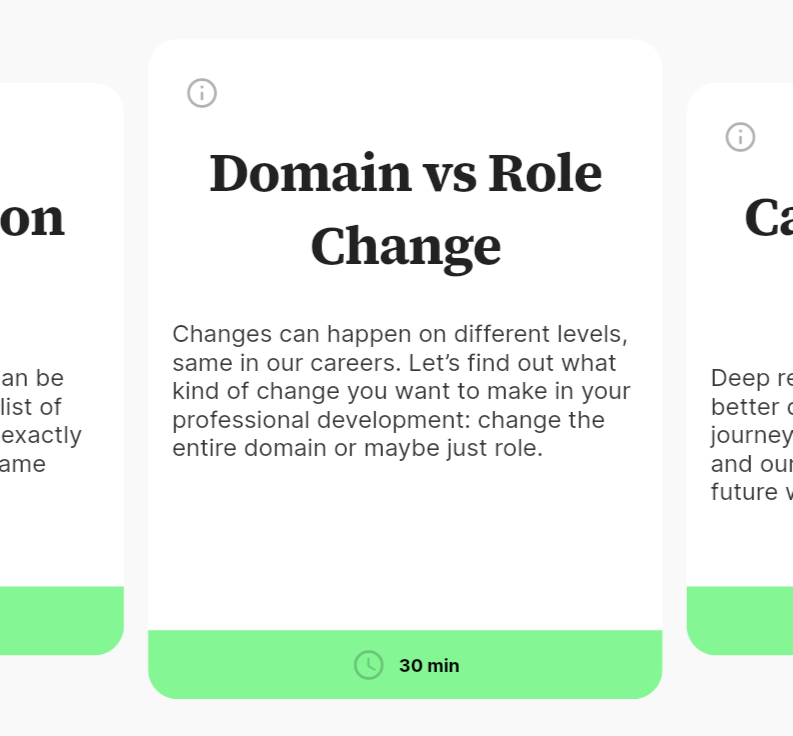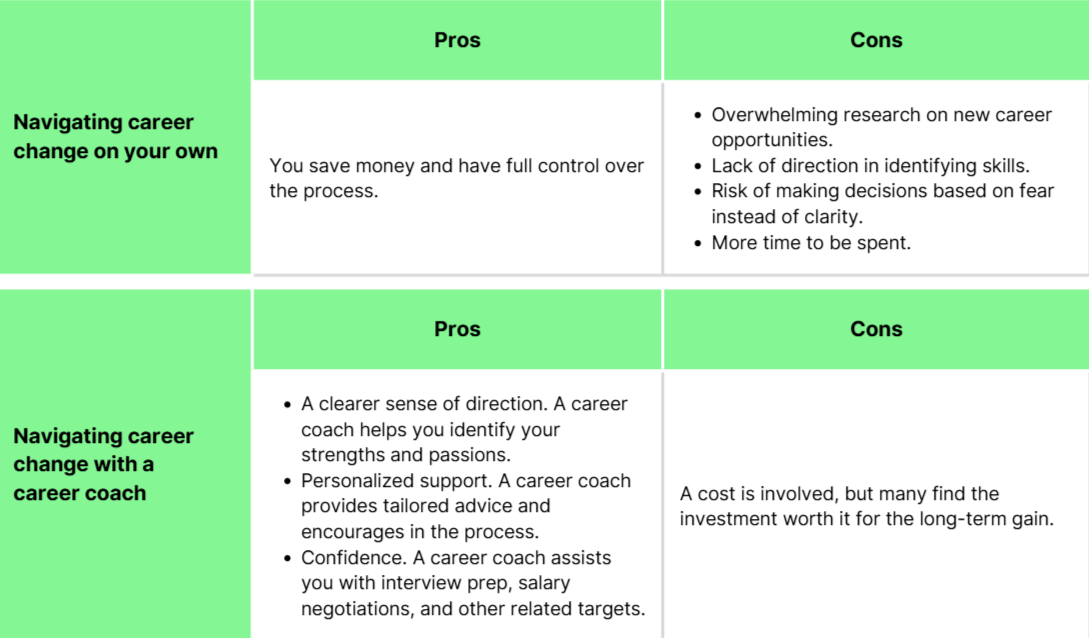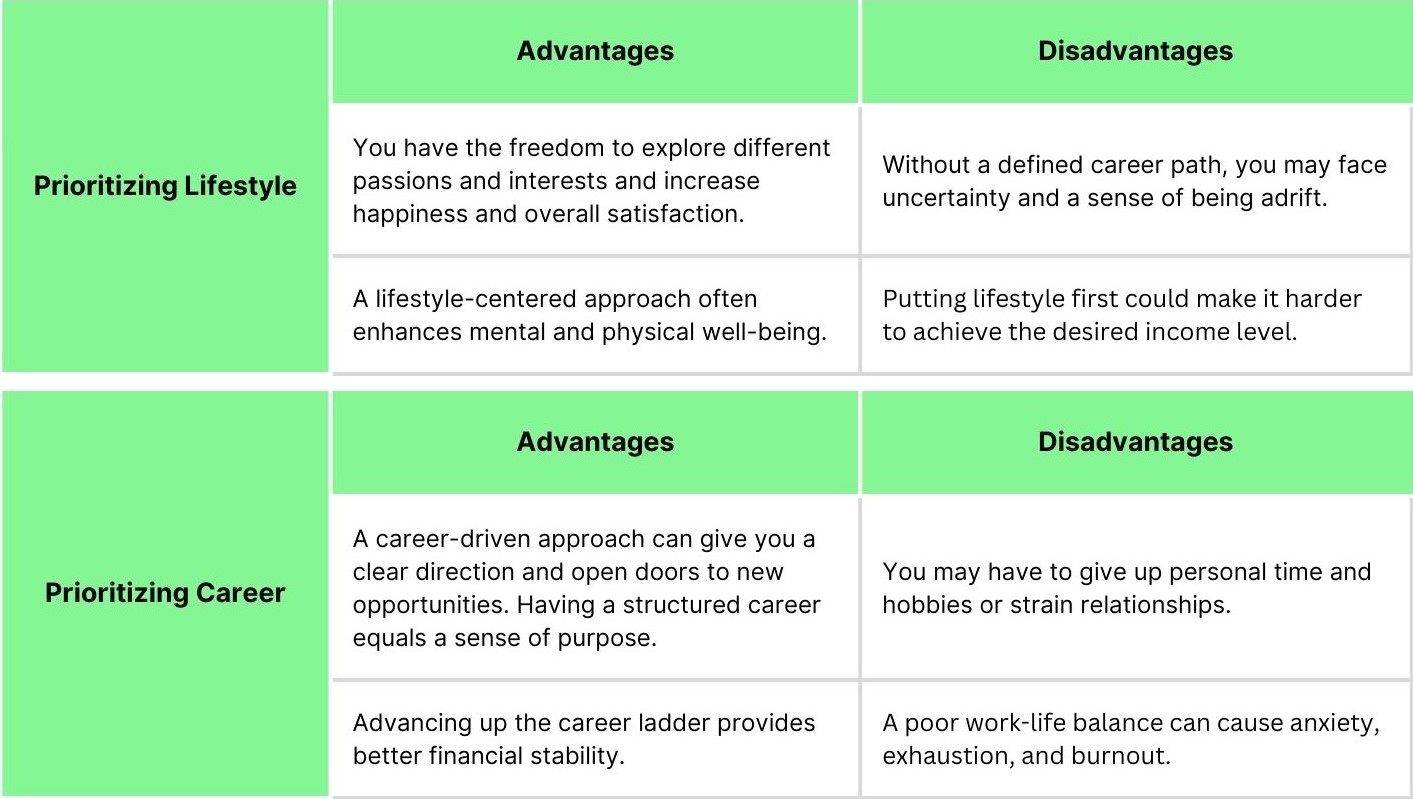Thinking about a career change but not sure how to take a step forward? Wondering if it is too late to start fresh in a different field? Career transition marks growth but also brings challenges. You adjust to new roles and build new skills. With career coaching, you can smoothly navigate career changes and get the guidance to confidently move toward a path that is right for you. Whether a career change at 30 or a career change at 40 and beyond, all is achievable.
How about we explore what career transition looks like, why it can be challenging, and how working with a career coach could help build the bridge between where you are and where you want to be?
Career change types: role, position, or job?
Career change is not always about starting from scratch. Career transitions vary from subtle shifts to bold moves into entirely new industries:
- A job switch involves a minimal change in the role but a new employer or self-employed model: from a sales specialist at a mid-size company to a sales specialist at a large company.
- A career change involves a new industry or field of work: from an accountant to an event manager or from a nurse to a real estate agent.
- A role change within the same industry lies between the two—offering growth and variety without leaving the sector: a chef becomes a restaurant manager at the same restaurant.
When in doubt, you can evaluate your desire for a career change in a domain or role with the Domain vs Role Change exercise.

As a result of the exercise, you will be confident in the level of change you want to make: to go for a completely different domain or finetune your responsibilities within the current role. No matter the scale of your change, career transition is still a nut to crack.
Challenges of career change
When you take the leap to a whole new career, you may doubt your experience or don’t know what careers exist on the job market. Career change in your 30s may come with financial uncertainties and imposter syndrome. Career change in your 40s or 50s brings family dependencies and a steep learning curve for new skills. Both aren’t easy:
- Responsibilities and financials. The challenge is to continue to commit to responsibilities, like paying the bills and caring for loved ones. Ensuring you meet basic life necessities, such as housing, food, and healthcare, is key while transitioning careers. Otherwise, career change feels risky to pivot.
How to handle:- Build a financial cushion before leaving your current job. Save at least 6 months’ worth of living expenses to weather potential gaps in income. You can search for part-time opportunities or freelancing in your new field to ease the career transition while keeping a steady income.
- Discuss plans with your family to create a shared strategy for managing duties.
- Create a plan with small, actionable steps to progress at your own pace.
- Skills, learning, and time bound. Switching careers usually requires new training or certifications and dedicated time for those during evenings or weekends.
How to handle: The answer is mapping your transferable skills and skills to gain to a career plan. Learning better advances if specifying time blocks. For example, 30 minutes a day to boost programming language. The time blocks approach applies to various areas to keep a healthy work-life balance. - Finding the right fit. Between work, family, and other activities, research and planning can be overwhelming. Searching for open job opportunities, applying for them, and going through cycles of interviews for a new role takes time and patience. But persistence means a lot.
How to handle:- Identify what you want in a role—flexibility, creativity, or impact. If you leave a job without knowing what to do next, test the waters with internships and volunteering to find an occupation that resonates with you.
- View and use rejections (if any) only as a means of feedback to refine your approach and strengthen your candidacy.
- I am a “beginner” again. Fear of starting over can hold you back.
How to handle: Treat this stage as an opportunity to learn and grow. You don’t erase your past—you build experience and credibility. For more confidence, seek mentorship from someone who has successfully navigated a similar path.
Navigating career change on your own vs. with a career coach
Going through a career change alone seems tempting—after all, no one knows your life better than you, right? But let’s compare the two paths:

Working with a career coach

“Why go through a career transition alone? As a career coach, I’ve seen how overwhelming and isolating this process can be. Whether you’re moving from employment to entrepreneurship, transitioning back into the workforce, or simply shifting into a new role, guidance can make all the difference.
Coaching provides a safe space to:
- Clarify your goals and strengths
- Overcome doubts and skill gaps
- Strategically position yourself for success
Through my experience helping clients navigate career transitions, I’ve learned that having a structured, supportive approach accelerates success and builds confidence. Don’t let uncertainty hold you back—take the leap with the right tools and support to ensure a smooth and rewarding transition.”
Jane Klymenko, a career expert at Amy with 10+ years of coaching experience and the main area of expertise in Work-Life Balance
Standing at a crossroads with too many signs pointing in every direction—that is how career change, in most cases, feels. And that is where a career coach comes in to help you figure out the path right for you and make your career transition smoother.
Action plan for career change with a coach
- Assessment. A career coach defines why you are looking for a change and your challenges. They outline values, goals, and skills transferable from previous work experience. This way, you don’t have to second-guess. You have a clear starting point.
- Roadmap. Whether switching industries, chasing a leadership role, or starting fresh, a career coach creates a roadmap for you. Imagine GPS, but for your career. The roadmap often comes as an actionable career plan to track progress and results. You have measurable steps and resources needed.
- Preparation. Beyond identifying the career paths and opportunities that align with you, a career coach equips you with a well-structured resume, interview preparation, job search strategies and sources, and networking approaches.
- Support. Ever feel like you’re stuck in your head, going in circles? A coach keeps you on track, offering encouragement and boosting confidence. You aren’t doing this alone.
With a career coach by your side, navigating career change becomes less about fear and more about certainty. Besides, career coaches offer insights you might overlook, helping you spot opportunities and avoid pitfalls.

Success story at Amy: from software engineer to product manager
Background
Jake worked as a software engineer for a mid-sized tech company but wanted to transition into product management. While he had technical expertise, he lacked direct experience managing products and leading cross-functional teams. His dream was to work in a dynamic environment where he could bridge the gap between technology and customer needs.
Challenges
Jake faced several uncertainties and obstacles during his career transition:
- Confidence in his abilities: He doubted whether his technical background was sufficient to position himself as a product manager.
- Skill gaps: Jake struggled to identify which skills from his engineering role were transferable and which new skills he needed to develop.
- Networking and positioning: He was unsure how to build relationships in the product management field and effectively communicate his value during interviews.
- Additionally, Jake encountered challenges with managing self-doubt, setting realistic timelines, and navigating the overwhelming number of resources available for career changers.
Results of working with a career coach
A career coach helped Jake tackle his challenges step-by-step:
- Clarifying his unique value: identified the technical skills, problem-solving abilities, and customer focus from his engineering role that would be valuable as a product manager. This helped Jake craft a compelling narrative for his career transition.
- Building essential skills: developed a personalized learning plan, focusing on core product management skills like roadmap creation, stakeholder management, and market research.
- Strategic networking: learned how to approach industry professionals through LinkedIn and informational interviews. He also leveraged his existing network to find opportunities in product management.
- Mock interviews and confidence building: conducted mock interviews to prepare him for common product management questions, helping Jake feel more confident and articulate during real interviews.
After six months of focused work, Jake secured a product management role at a growing startup. He is thriving in his new position and feels fulfilled by the challenges and creativity it offers. Jake attributes his success to structured support, clear guidance, and his own dedication to the process.
Meet your coach at Amy
At Amy, you can choose your personal career coach based on their area of expertise and, of course, on your objectives. A coach will help you uncover strengths, clarify next steps, and build the confidence to move forward. You will have a trusted partner to support your journey. With structured guidance, real-world insights, and tailored strategies, you are designing a career that fits your life.
Shape your career change with career coaching to embrace a new path with ease.








